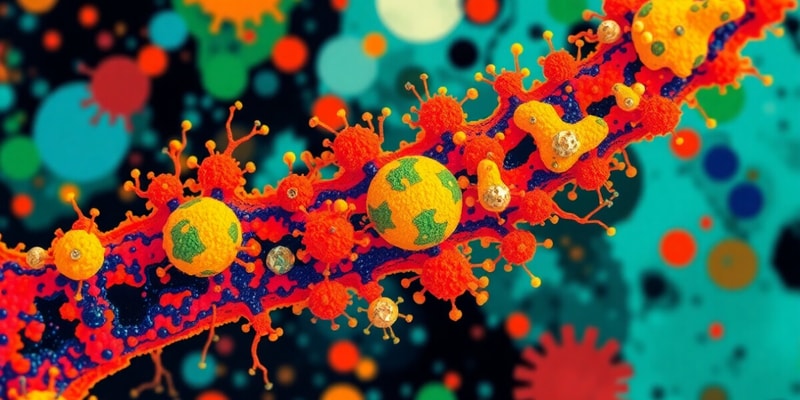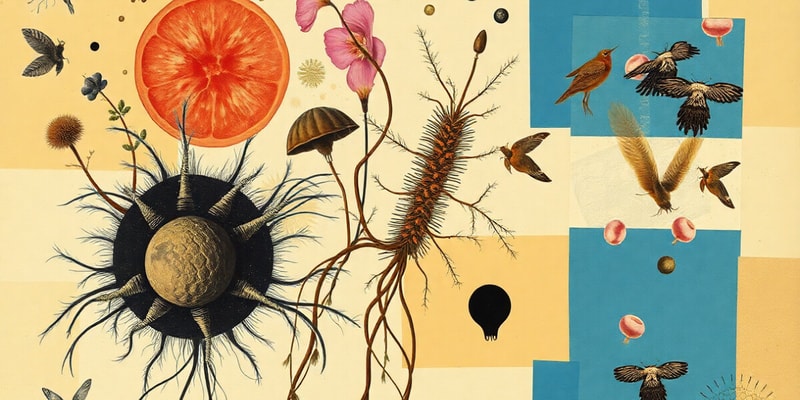Podcast
Questions and Answers
What is microbiology?
What is microbiology?
The study of very small organisms (microorganisms) that cannot be seen with the naked eye.
Which of the following is NOT considered a major group of microorganisms?
Which of the following is NOT considered a major group of microorganisms?
Louis Pasteur disproved the theory of spontaneous generation.
Louis Pasteur disproved the theory of spontaneous generation.
True
Who is known for the development of first vaccines?
Who is known for the development of first vaccines?
Signup and view all the answers
What percentage of the total course assessment is attributed to the final theory exam?
What percentage of the total course assessment is attributed to the final theory exam?
Signup and view all the answers
What did Antonie van Leeuwenhoek refer to in his observations?
What did Antonie van Leeuwenhoek refer to in his observations?
Signup and view all the answers
The process of _____ was developed by Louis Pasteur.
The process of _____ was developed by Louis Pasteur.
Signup and view all the answers
Koch's postulates established a standard for identifying the specific cause of an infectious disease.
Koch's postulates established a standard for identifying the specific cause of an infectious disease.
Signup and view all the answers
Which microorganism is known for being multicellular?
Which microorganism is known for being multicellular?
Signup and view all the answers
Study Notes
Course Information
- Instructor: Dr. Kelly Brathwaite
- Office Hours: Wednesdays, 10 am - 12 pm
- Office Location: Biology Extension
- Email: [email protected]
Course Policies
- Respectful: Be respectful to others.
- Punctual: Be on time.
- Attentive: Pay attention.
- Disruptions: If you cannot pay attention, do not disrupt others.
- Cell Phones: Switch off or silence your cell phones.
### Course Overview
- Focus: Basic principles of microbiology.
- Topics: Microbial cell structure and function, diversity, metabolism, control, and importance in human activities.
- Prerequisites: BIOL1020: Diversity of Life I (BIOL1051: Biodiversity I) and BIOC1015: Introduction to Biochemistry (or BIOC1351: Introductory Biochemistry).
### Textbook
- Title: Brock Biology of Microorganisms
- Authors: Madigan, MT, Bender, KS, Buckley, DH, Sattley, WM, and Stahl, DA.
- Edition: 16th edition (2020).
- Publisher: Pearson Benjamin Cummings.
- ISBN: QR41.2.B77
Course Assessments
- Final Theory Exam: 2 hours, 50% of final grade.
- In-Course Tests/Assignments: 20% of final grade.
- Practical Reports/Quizzes/Test: 30% of final grade.
### Course Outline
- Lectures: 18
- Tutorials: 6
- Practicals: 6
### Assessments
- In-Course Tests: 2
- Final Exam: 1
- Practical Assessments: Lab reports, skills, calculations, quizzes, lab test.
### Lecture Objectives
- Microbiology Definition: The study of microscopic organisms.
- Microscopy: Magnification is required to visualize microorganisms.
- Microorganisms: Exist as single cells or clusters of cells (excluding viruses, which are acellular).
- History: Covers spontaneous generation, the germ theory, and key figures like van Leeuwenhoek, Pasteur, and Koch.
### Microorganisms
- Major Groups: Bacteria, viruses, fungi (molds), protozoa, helminths, algae.
- Bacterial Cell Types: Various morphologies (shapes) and structures.
- Bacterial Cell Wall: Protects bacteria and gives them shape.
- Virus Types: Diverse morphologies and mechanisms of infection.
- Fungal Types: Includes yeasts and molds.
- Comparison of Sizes: Microorganism sizes range from nanometers to millimeters.
### History
- Prominent Discoveries: Microscopy, disproval of spontaneous generation, development of medical microbiology, microbiological techniques.
### Antonie Van Leeuwenhoek (1632-1723)
- Contribution: Dutch amateur microscope builder who observed and described "wee animacules" (microorganisms).
- Microscopes: Built simple microscopes of his own design.
- Royal Society of London: Published his observations in 1684.
- Drawings: Published drawings of bacteria in 1684.
Spontaneous Generation
- Definition: The theory that life arises from non-living matter.
- Historical Examples: Aristotle believed dust created fleas, maggots arose from rotting meat, and bread or wheat produced mice.
- Experiments: Francesco Redi (1626-1697) performed experiments to challenge spontaneous generation.
### Disproval of Spontaneous Generation
- Louis Pasteur: French chemist who disproved spontaneous generation.
- Experiment: Swan-necked flasks experiment demonstrated that microorganisms in the air were the source of putrefaction.
- Conclusion: "Life only comes from previously existing life."
### Louis Pasteur (1822-1895)
- Accomplishments: Developed the Pasteur flask, Pasteur pipette, and pasteurization.
- Vaccines: Contributed to early vaccine development.
- Disease Control: Developed cures for rabies, anthrax, chicken cholera, and silkworm diseases.
### Robert Koch (1843-1910)
- Contribution: Developed experimental method used to determine whether a specific microorganism causes a disease.
- Antrax: Proved Bacillus anthracis caused anthrax.
- Tuberculosis: Awarded the 1905 Nobel Prize for his work on tuberculosis.
- Koch’s Postulates: Established criteria to identify the specific cause of an infectious disease.
### Limitations to Koch’s Postulates
- Normal Flora: Some microorganisms are part of normal flora but can cause disease under certain conditions.
- Opportunistic Pathogens: Microorganisms that cause disease in individuals with compromised immune systems.
- Subclinical Infection: Some individuals may carry a pathogen without showing symptoms.
- Challenges: Not all pathogenic microorganisms can be grown in pure culture, and suitable animal models may not be available.
- Ethical Concerns: Some experiments involving humans or animals are not ethically feasible.
### Ferdinand Cohn (1828-1898)
- Contribution: German botanist known for his studies of bacteria, algae, and fungi.
- Founder of Bacteriology: Considered one of the founders of bacteriology.
- Bacterial Classification: Classified bacteria into four groups based on shape.
- Endospores: Showed that Bacillus bacteria can form endospores under stressful conditions.
### Martinus Beijerinck (1851-1931)
- Contribution: Dutch microbiologist recognized for his work in virology and environmental microbiology.
- Soil and Water Bacteria: Studied bacteria in soil and water, including nitrogen-fixing bacteria (Azotobacter).
- Tobacco Mosaic Virus: Investigated tobacco mosaic virus and determined it was caused by a virus.
- Enrichment Culture: Developed the principles of enrichment culture.
Summary
- Early Work: Pioneering discoveries in microbiology led to understanding the role of microorganisms in infectious diseases.
- Modern Techniques: Scientific advancements in microbiology paved the way for modern practices and medical microbiology.
Studying That Suits You
Use AI to generate personalized quizzes and flashcards to suit your learning preferences.
Related Documents
Description
Explore the basic principles of microbiology, including microbial cell structure, diversity, metabolism, and their significance in human activities. This quiz covers course policies, prerequisites, and the textbook utilized in the course. Test your understanding and readiness for Dr. Kelly Brathwaite's class!




